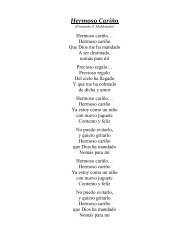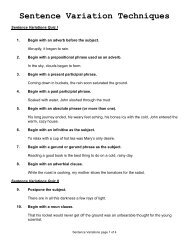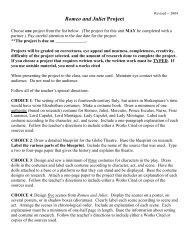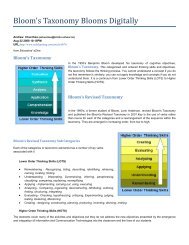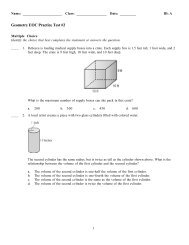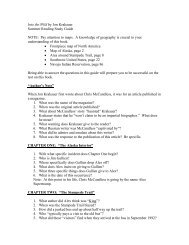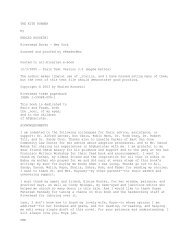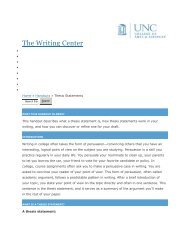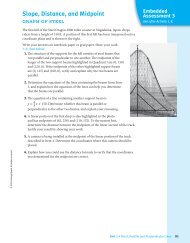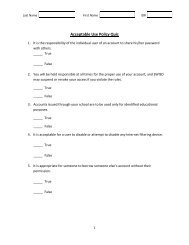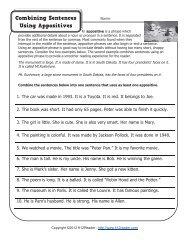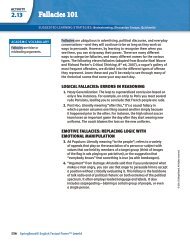Unit 1.pdf - Southwest High School
Unit 1.pdf - Southwest High School
Unit 1.pdf - Southwest High School
Create successful ePaper yourself
Turn your PDF publications into a flip-book with our unique Google optimized e-Paper software.
Activity 1.17<br />
continued<br />
Reading with a Cultural Criticism Lens<br />
My Notes<br />
Chunk<br />
5<br />
pressing me forward irresistibly. And it was at this moment, as I stood<br />
there with the rifle in my hands, that I first grasped the hollowness, the<br />
futility of the white man’s dominion in the East. Here was I, the white<br />
man with his gun, standing in front of the unarmed crowd—seemingly<br />
the leading actor of the piece; but in reality I was only an absurd puppet<br />
pushed to and fro by the will of those yellow faces behind. I perceived<br />
in this moment that when the white man turns tyrant it is his own<br />
freedom that he destroys. He becomes a sort of hollow, posing dummy,<br />
the conventionalized figure of a sahib 14 . For it is the condition of his rule<br />
that he shall spend his life in trying to “impress the natives,” and so in<br />
every crisis he has got to do what the “natives” expect of him. He wears<br />
a mask, and his face grows to fit it. I had got to shoot the elephant. I had<br />
committed myself to doing it when I sent for the rifle. A sahib has got to<br />
act like a sahib; he has got to appear resolute, to know his own mind and<br />
do definite things. To come all that way, rifle in hand, with two thousand<br />
people marching at my heels, and then to trail feebly away, having done<br />
nothing—no, that was impossible. The crowd would laugh at me. And my<br />
whole life, every white man’s in the East, was one long struggle not to be<br />
laughed at.<br />
8 But I did not want to shoot the elephant. I watched him beating his<br />
bunch of grass against his knees, with that preoccupied grandmotherly air<br />
that elephants have. It seemed to me that it would be murder to shoot him.<br />
At that age I was not squeamish about killing animals, but I had never shot<br />
an elephant and never wanted to. (Somehow it always seems worse to kill a<br />
large animal.) Besides, there was the beast’s owner to be considered. Alive,<br />
the elephant was worth at least a hundred pounds; dead, he would only<br />
be worth the value of his tusks, five pounds, possibly. But I had got to act<br />
quickly. I turned to the experienced-looking Burmans who had been there<br />
when we arrived, and asked them how the elephant had been behaving.<br />
They all said the same thing; he took no notice of you if you left him alone,<br />
but he might charge if you went too close to him.<br />
9 It was perfectly clear to me what I ought to do. I ought to walk up to<br />
within, say, twenty-five yards of the elephant and test his behavior. If he<br />
charged I could shoot; if he took no notice of me, it would be safe to leave<br />
him until the mahout came back. But I also knew that I was going to do<br />
no such thing. I was a poor shot with a rifle and the ground was soft mud<br />
into which one would sink at every step. If the elephant charged and I<br />
missed him, I should have about as much chance as a toad under a steam<br />
roller. But even then I was not thinking particularly of my own skin, only<br />
of the watchful yellow faces behind. For at that moment, with the crowd<br />
watching me, I was not afraid in the ordinary sense, as I would have<br />
been if I had been alone. A white man mustn’t be frightened in front of<br />
“natives”; and so, in general, he isn’t frightened. The thought in my mind<br />
© 2011 College Board. All rights reserved.<br />
14<br />
sahib: native term for a European gentleman<br />
62 SpringBoard® English Textual Power Senior English




